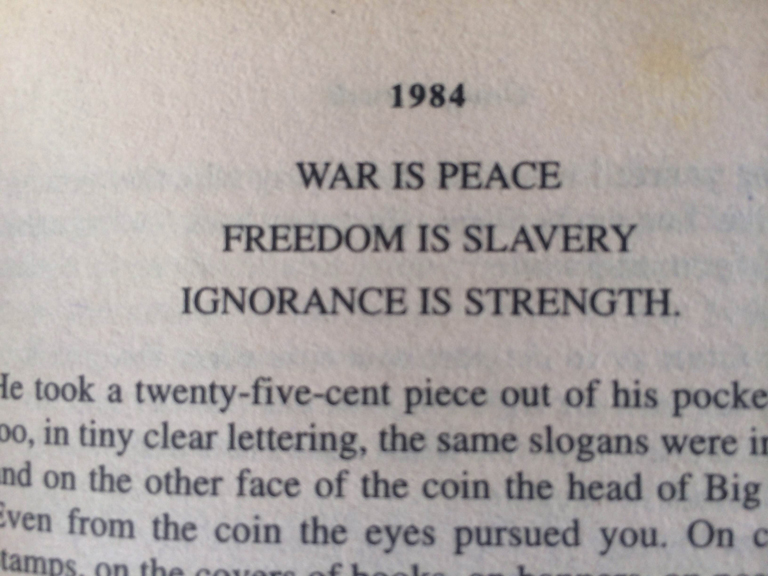I honestly don’t even know where to begin talking about 1984. On Amazon’s list of 100 books to read in a lifetime, Nick has been telling me to read it for months because he loved it and understands my obsession with dystopian fiction.
I finished this book over a week ago, and it’s still haunting me. That last line is especially chilling.
From Goodreads:
While 1984 has come and gone, Orwell’s narrative is more timely that ever. 1984 presents a “negative utopia”, that is at once a startling and haunting vision of the world — so powerful that it’s completely convincing from start to finish. No one can deny the power of this novel, its hold on the imaginations of entire generations of readers, or the resiliency of its admonitions — a legacy that seems to grow, not lessen, with the passage of time.
In this society, everything that everyone does is being watched, all of the time. There is a perpetual state of war. There are not enough resources for everyone. There is no independent thought. There is constant fear. It’s not hard to imagine a world like the one Orwell created, which is probably the scariest part about this novel.
It’s hard to talk about 1984 without giving too much away, but I will say that even though I knew the general premise of the book, it was not at all what I was expecting. Every page had me guessing, and I never guessed right. On the first page, we are introduced to the protagonist, Winston, who seems to be one of the few people aware of the control that Big Brother asserts over his every action, and he can’t stand it. Although individualism and independent thinking are forbidden, he looks for even the smallest ways to be in control of himself – by sitting in a corner of his apartment in which the telescreen can’t see him (a telescreen is a two-way television that you can never turn off and are constantly being watched through), and even by purchasing and writing in a diary, a forbidden item. While he feels he cannot overthrow the government, his goal is to die hating Big Brother.
By simply thinking this, Winston has committed “thoughtcrime” – any thought that goes against Big Brother, punishable by death. Using the telescreen, the Thought Police can detect these kinds of thoughts by something so small as a half-second facial expression.
The Party is working on a long-term project to change English into “Newspeak,” an invented language that uses as few words as possible so that people do not have to think about nuanced meanings. The less people think, the better Big Brother can control them.
Yet, the government carefully chooses the words it uses to communicate with its citizens. Winston works for the Ministry of Truth, which despite its name, is concerned with altering past newspaper articles, books, photographs, films, etc. The Ministry of Peace deals with the constant wars, the Ministry of Plenty rations food, and the Ministry of Love finds, tortures, and kills people who are suspected of going against Big Brother in any way, even in thought. The government makes its citizens truly believe that the Ministry of Truth accurately reports the news, that the Ministry of Peace is aimed at protecting its citizens, that the Ministry of Plenty increases its production of food and goods, and the Ministry of Peace keeps Oceania safe.
We learn the ways in which the Party asserts to control the minds of the citizens and their every action — even their memories. Winston’s job at the Ministry of Truth is to change printed books and newspaper articles to fit whatever state Oceania is in right now. That may be changing the outcomes of wars, changing predictions made by leaders, or re-writing alliances. Once history is changed, the previous items are incinerated, and there is no way to prove that history has been altered in any way. Even memories seem to change – once some new piece of information is disseminated, the citizens act as though this is how it has always been.
I won’t give away anything else, because the book would not be the same if you go into it knowing too much.
What did you think of 1984? Do you think his world is far-fetched?













[…] 1984 by George Orwell […]